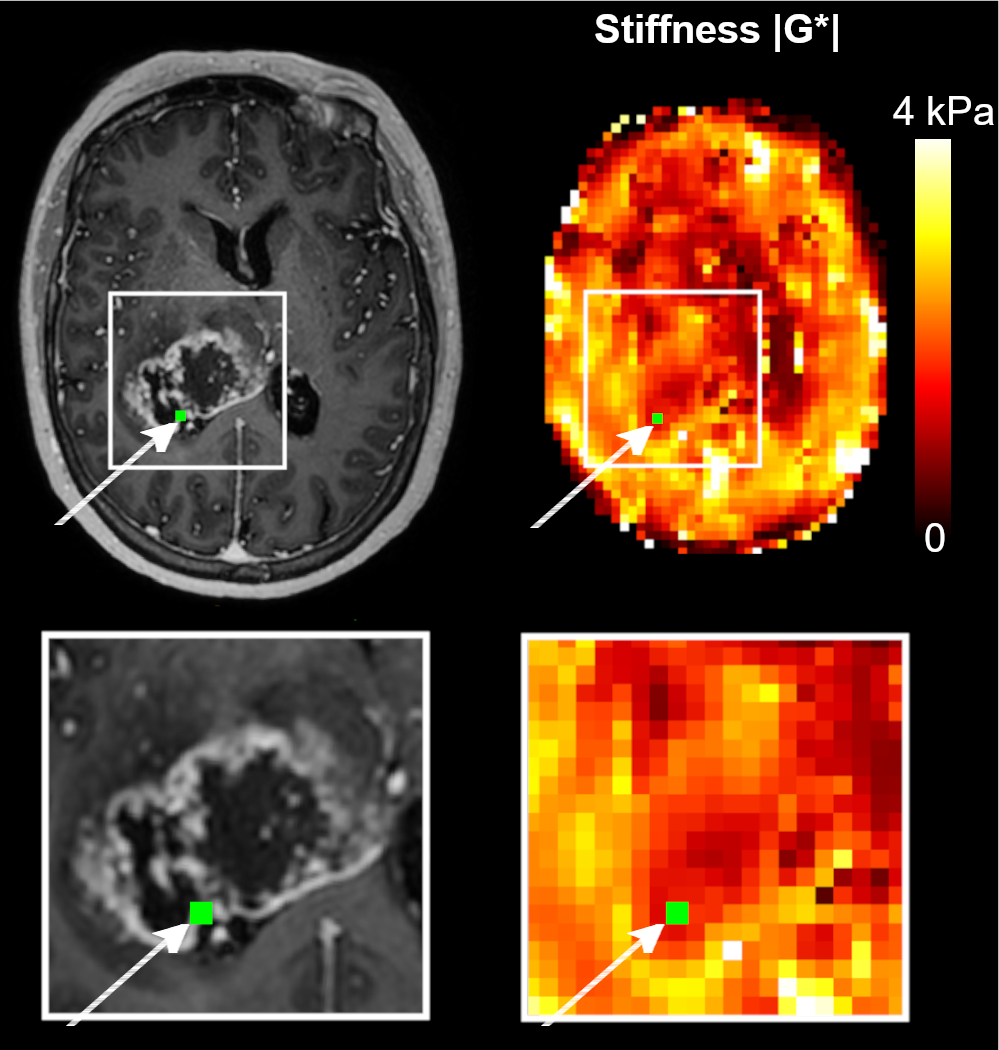The PhD defence and trial lecture will be streamed. The chair of the defence will moderate the disputation.
Ex auditorio questions: the chair of the defence will invite the audience physically present in the auditorium to ask ex auditorio questions.
Trial lecture
Time and place: April 20, 2023; 10:15 AM, Lille Fysiske auditorium (V232) - Fysikkbygningen
Title: "Scattering and viscoelasticity in living tissues"
Main research findings
In the pursuit of treatment strategies for brain tumors, advanced MRI techniques are used to investigate the properties of tumors. Cancer is known to affect the biomechanical properties of tissues, such as stiffness. MR elastography (MRE) is an imaging technique that can measure stiffness noninvasively. In this thesis, we perform MRE in the brain of healthy subjects and patients with glioblastoma, the most aggressive type of brain tumor. We find that MRE is a robust technique for measuring brain tissue stiffness and that it can help us understand the properties of brain tumors. In patients with glioblastoma, we find that the biomechanical properties measured by MRE differ between tumor tissue and the healthy brain. Consistent with the infiltrative nature of the disease, abnormal values can extend beyond the tumor borders that are visible on conventional MR images. Low tissue stiffness is moreover associated with higher blood flow. MRE imaging of glioblastoma can demonstrate tumor heterogeneity before surgery. We show that tumor regions of increased stiffness were associated with extracellular matrix reorganization using RNA sequencing of tissue biopsies. Notably, biopsies identified as stiff by MRE were associated with a gene expression signal that correlates with shorter survival of glioblastoma patients.

Summary (Norwegian)
I jakten på nye muligheter for behandling av hjernekreft brukes avanserte MR-teknikker til å lære mer om hjernesvulster. MR-elastografi (MRE) er en ikke-invasiv avbildningsteknikk som kan måle hjernevevets stivhet, som vi vet kan endres ved kreft. I denne avhandlingen er MR-elastografi brukt i friske frivillige og pasienter med glioblastom, den mest aggressive typen hjernekreft. Vi fant at MRE er en robust teknikk som kan brukes til å måle vevsstivhet i hjernen. I pasienter med glioblastom skilte svulstens biomekaniske egenskaper seg fra målinger i friskt hjernevev. Vi fant abnormale verdier også utenfor svulsten slik den er synlig på konvensjonelle MR-bilder, noe som illustrerer hvor infiltrerende denne sykdommen er. Lav stivhet var forbundet med høy blodflyt. MRE-avbildning av glioblastom før operasjon kan dessuten gi informasjon om svulstens heterogenitet. RNA-sekvensering av vevsprøver tatt under operasjonen viste at stivere områder av svulsten var forbundet med reorganisering av den ekstracellulære matrisen. Vevsprøver som ble klassifisert som stive ved MRE var forbundet med et genuttrykk som korrelerte med kortere overlevelse i pasienter med glioblastom.
Candidate contact information
ReasearchGate: Siri Fløgstad Svensson
Adjudication Committee
-
Senior Lecturer Najat Salameh, Center for Adaptable MRI Technology, School of Medicine, Life Sciences and Nutrition, Institute of Medical Sciences, University of Aberdeen, Scotland
-
Associate Professor Antti-Pekka Elomaa, Microsurgery Center, Kuopio University Hospital, Finland
-
Professor Dag Kristian Dysthe, Department of Physics, University of Oslo, Norway
Supervisors
- Professor Eirik Malinen, Department of Physics, University of Oslo, Norway
- Dr. Kyrre Eeg Emblem, Radiology and Nuclear Medicine - MRI Research & Technology, Oslo University Hospital, Norway
- Professor Sverre Holm, Department of Physics, University of Oslo, Norway
Chair of defence
- Professor Alexander Lincoln Read, Department of Physics, University of Oslo, Norway
Contact information to Department: Line Trosterud Resvold
